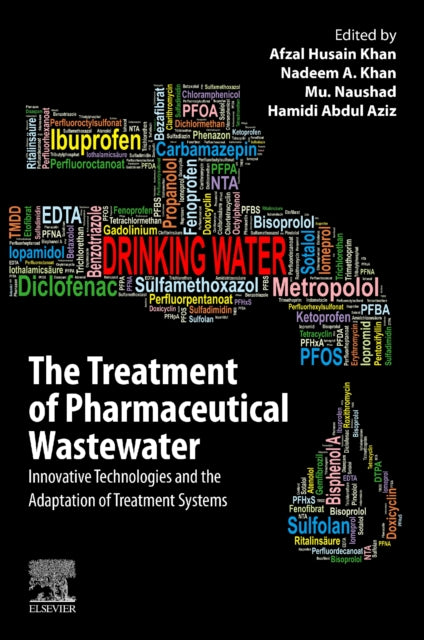Shulph Ink
The Treatment of Pharmaceutical Wastewater: Innovative Technologies and the Adaptation of Treatment Systems
The Treatment of Pharmaceutical Wastewater: Innovative Technologies and the Adaptation of Treatment Systems
YOU SAVE £16.66
- Condition: Brand new
- UK Delivery times: Usually arrives within 2 - 3 working days
- UK Shipping: Fee starts at £2.39. Subject to product weight & dimension
Bulk ordering. Want 15 or more copies? Get a personalised quote and bigger discounts. Learn more about bulk orders.
Couldn't load pickup availability
- More about The Treatment of Pharmaceutical Wastewater: Innovative Technologies and the Adaptation of Treatment Systems
The book discusses pharmaceutical waste treatment technologies, their harmful effects on the environment, and the 3Rs (reduce, reuse, recycle) applied to treatment and resource recovery systems. Case studies are included to provide a better understanding of the practical aspects of treatment and modeling.
Format: Paperback / softback
Length: 454 pages
Publication date: 27 January 2023
Publisher: Elsevier - Health Sciences Division
The Treatment of Pharmaceutical Wastewater: Innovative Technologies and the Adaptation of Treatment Systems delves into comprehensive coverage of pharmaceutical sources, treatment technologies, their detrimental impacts on the natural environment, and emerging technological advancements and upgrades of existing treatment systems. This book emphasizes the application of the 3Rs (reduce, reuse, recycle) principles in treatment and resource recovery systems for pharmaceutical treatment. Case studies are provided to enhance understanding of the practical aspects of treatment and modeling, making this invaluable guide a must-read for civil and environmental engineers, as well as researchers seeking to delve into the intricate complexities and treatment schemes for pharmaceutical wastewaters.
Pharmaceutical waste is a significant environmental concern due to the presence of various pharmaceutical compounds and their potential harmful effects on ecosystems and human health. The treatment of pharmaceutical wastewater is crucial to mitigate these risks and ensure the safe disposal of these waste streams.
There are several treatment technologies available for pharmaceutical wastewater, including physical, chemical, and biological methods. Physical methods such as sedimentation, flotation, and filtration are commonly used to remove solid particles and organic matter from wastewater. Chemical methods, such as oxidation, reduction, and sorption, are employed to remove or neutralize pharmaceutical compounds. Biological methods, such as activated sludge treatment and biofiltration, utilize microorganisms to break down and remove pharmaceutical compounds from wastewater.
However, the treatment of pharmaceutical wastewater presents several challenges, including the presence of complex pharmaceutical compounds, varying concentrations of pollutants, and the need for efficient and cost-effective treatment systems. Additionally, the disposal of treated pharmaceutical wastewater can also pose environmental risks, such as groundwater contamination and surface water pollution.
To address these challenges, researchers and engineers are continuously developing innovative technologies and adapting existing treatment systems to improve the treatment of pharmaceutical wastewater. One such technology is the use of advanced oxidation processes, such as ozone, peroxygen, and photocatalysis, which can effectively remove pharmaceutical compounds from wastewater. Another innovative approach is the development of hybrid treatment systems, which combine physical, chemical, and biological methods to achieve better treatment outcomes.
In addition to technological advancements, it is also important to adapt treatment systems to the specific characteristics of pharmaceutical wastewater. For example, the concentration of pharmaceutical compounds can vary significantly depending on the source of the wastewater and the manufacturing process. Therefore, treatment systems must be designed to handle a wide range of concentrations and types of pharmaceutical compounds.
Furthermore, the treatment of pharmaceutical wastewater must consider the economic and environmental implications of the treatment process. Cost-effective treatment systems that minimize the use of resources and energy are essential to ensure the sustainability of pharmaceutical wastewater treatment. Additionally, the disposal of treated pharmaceutical wastewater must be done in a manner that minimizes the potential environmental impacts and ensures the safe reuse of treated water.
In conclusion, the treatment of pharmaceutical wastewater is a complex and challenging task that requires innovative technologies and adaptive treatment systems. By implementing these technologies and adapting treatment systems to the specific characteristics of pharmaceutical wastewater, we can improve the treatment of these waste streams and minimize their potential harmful effects on the environment and human health.
Dimension: 229 x 152 (mm)
ISBN-13: 9780323991605
This item can be found in:
UK and International shipping information
UK and International shipping information
UK Delivery and returns information:
- Delivery within 2 - 3 days when ordering in the UK.
- Shipping fee for UK customers from £2.39. Fully tracked shipping service available.
- Returns policy: Return within 30 days of receipt for full refund.
International deliveries:
Shulph Ink now ships to Australia, Belgium, Canada, France, Germany, Ireland, Italy, India, Luxembourg Saudi Arabia, Singapore, Spain, Netherlands, New Zealand, United Arab Emirates, United States of America.
- Delivery times: within 5 - 10 days for international orders.
- Shipping fee: charges vary for overseas orders. Only tracked services are available for most international orders. Some countries have untracked shipping options.
- Customs charges: If ordering to addresses outside the United Kingdom, you may or may not incur additional customs and duties fees during local delivery.


